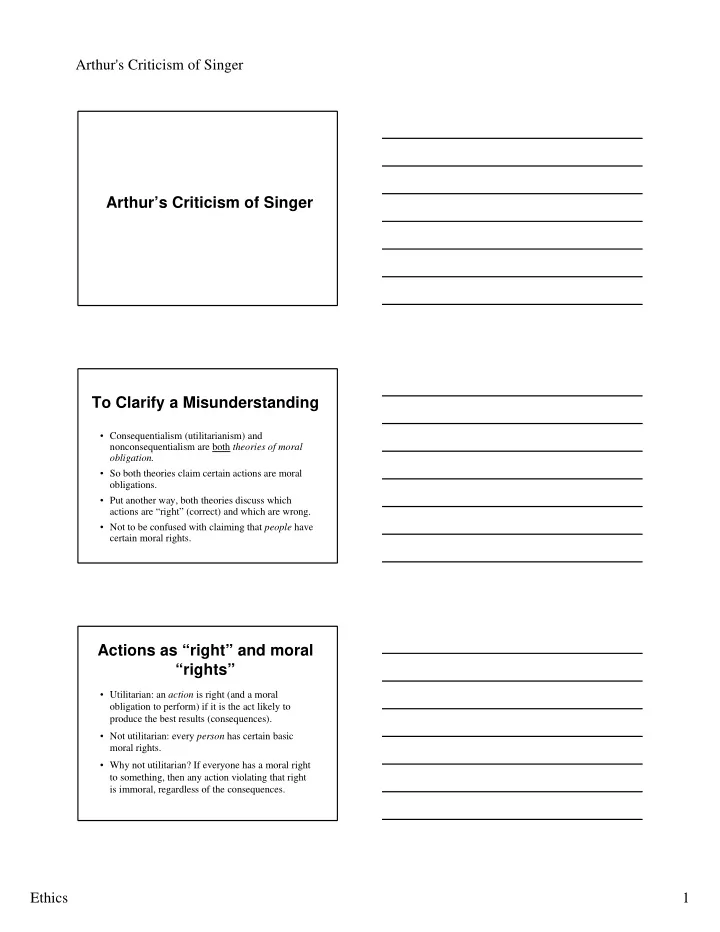

Arthur's Criticism of Singer Arthur’s Criticism of Singer To Clarify a Misunderstanding • Consequentialism (utilitarianism) and nonconsequentialism are both theories of moral obligation. • So both theories claim certain actions are moral obligations. • Put another way, both theories discuss which actions are “right” (correct) and which are wrong. • Not to be confused with claiming that people have certain moral rights. Actions as “right” and moral “rights” • Utilitarian: an action is right (and a moral obligation to perform) if it is the act likely to produce the best results (consequences). • Not utilitarian: every person has certain basic moral rights. • Why not utilitarian? If everyone has a moral right to something, then any action violating that right is immoral, regardless of the consequences. Ethics 1
Arthur's Criticism of Singer Singer’s “Greater Moral Evil” Rule • CMI: “If it is in our power to prevent something bad from happening without thereby sacrificing something of comparable moral importance, we ought, morally, to do so. • Arthur calls this the “greater moral evil rule.” We are entitled to keep our earnings only if there is no way to use them to prevent a greater evil. Arthur: This Is “One Part of Morality” • Underlying idea: “Like amounts of suffering or happiness are of equal importance, regardless of who is experiencing them.” • Arthur: This is one important part of ethics. • But it leaves out other parts... Entitlements • Singer’s principle ignores an important part of morality: entitlements – Rights – Desert • Rights: we have a right to our bodies even when giving up the right would relieve great suffering or create happiness. Ethics 2
Arthur's Criticism of Singer Rights are Not Absolute • Don’t oversimplify Arthur. Just as he claims CMI (greater moral evil) rule alone is insufficient, he also claims rights/desert alone not enough. • Sometimes we are morally obligated to give up our rights, even to our bodies, but not “when the cost to us is substantial.” Desert • One “entitlement” is rights. The other is desert : some people deserve benefits (or punishments) not because of future consequences but because of past actions. • Example of industrious and lazy farmer. Even if better consequences by giving money to lazy farmer, the industrious farmer may deserve to keep greater wealth. Like Rights, Desert Not Absolute • Arthur: “Perhaps [the hard-working farmer’s] deserving the product of his labor is outweighed by the greater need of his lazy neighbor, or perhaps it isn’t.” • Arthur: both important: CMI and entitlements. • Arthur a nonconsequentialist, but not absolute rights. Prima facie rights and deserts. Ethics 3
Arthur's Criticism of Singer Our “Commonly Shared Morality” • Arthur: “our commonly shared morality requires that we ignore neither consequences nor entitlements.” (p. 775) • But is our “commonly shared morality” the right one? Arthur himself: “unless we are moral relativists, the mere fact that entitlements are an important part of our moral code does not in itself justify such a role [my emphasis].” “Commonly Shared Morality” • Arthur: “Singer...can perhaps best be seen as a moral reformer advocating the rejection of rules which provide for distribution according to rights and desert.” [YES!] • Arthur: at one time our “commonly shared morality” allowed slavery, so clearly it’s not always correct. • So why should we think it (rather than Singer) is correct now? Arthur on Requirements of a Moral Code • It must be practical. • It must be able to gain the support of almost everyone. • It must not assume people are better than they are. (from p. 776) Ethics 4
Arthur's Criticism of Singer Idealistic vs Realistic Morality • Should morality establish the standards we should strive for ? (Idealistic) • Arthur’s “realistic” or “practical” morality may be suitable for those recommending policies but not for pure moral philosophers. • What should be the role of moral thinkers and philosophers? • Maybe important to distinguish between peresonal morality and social policy. What About the Rights of the Poor? • OK, imagine Arthur is correct about rights and entitlements. What about the rights of the poor? Aren’t they even more important? • Recall Aquinas (quoted by Singer, p. 416): “whatever a man has in superabundance is owed, as a matter of natural right , to the poor for their sustenance.” [my emphasis] Negative and Positive Rights • If someone has a right, someone else has an obligation? To do what? • To respect the right. • Negative rights imply negative obligations; positive rights imply positive obligations. • A negative obligation is an obligation NOT to do something; a positive obligation requires doing something. Ethics 5
Arthur's Criticism of Singer Negative and Positive Rights • What are some examples of negative rights? • Remember, these can be respected by doing nothing. • What are some examples of positive rights? • Are there positive rights? Aquinas claims giving to the poor is a natural right that the poor have. Arthur on Rights • Disagreeing with Aquinas, Arthur claims that the only natural rights we have just because we are human beings are negative rights. • Arthur: positive rights come about only through contracts or commitments. • This is a crucial debate in understanding issues of economic justice in our own country. Ethics 6
Recommend
More recommend